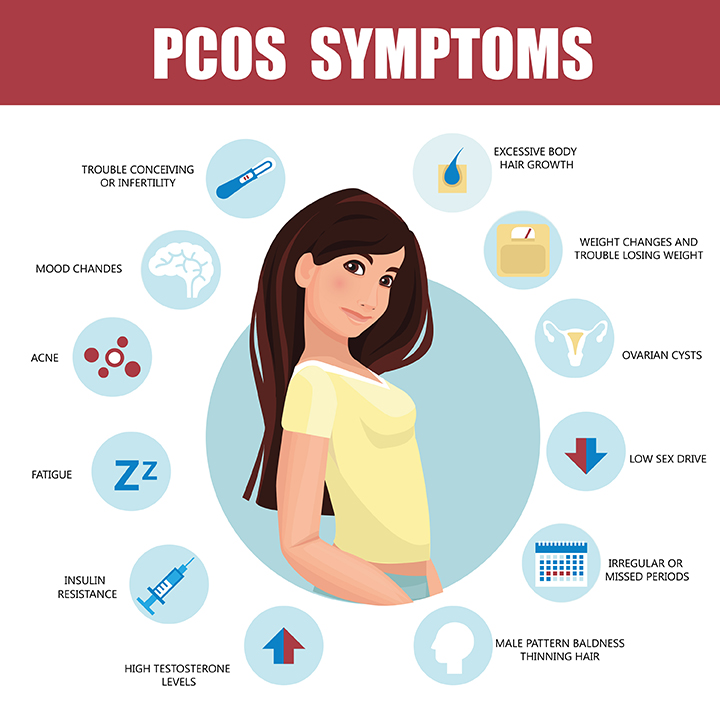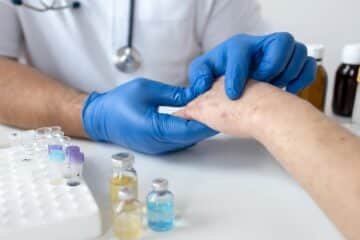Before discussing the PCOS diet to reduce PCOS symptoms, let’s first look at what PCOS is.
PCOS is an acronym for Polycystic Ovary Syndrome.
Polycystic ovary syndrome (PCOS) is a common health condition experienced by one in 10 women of childbearing age. In PCOS, a large number of small cysts develop in the ovaries.
This condition can lead to unpredictable hormonal behavior and increase the risk of diabetes, acne, infertility, and excessive hair growth.
Symptoms of PCOS patients
Most PCOS patients are overweight and are advised to exercise regularly, which can also help control their weight and other symptoms.

Women with PCOS may have high testosterone levels, which can lead to high hair growth, male pattern baldness, and acne, and an irregular menstrual cycle.
PCOS is one of the leading causes of infertility in women, and it accounts for 70% of infertility problems.
Also Read: Winter Hair Care: How to take care of your hair in winter at home
Mood swings and depression are also rare and unusual symptoms of this condition.
The two primary ways in which diet affects PCOS are weight management and insulin production and resistance.
If you have PCOS, a personalized PCOS diet plan as a primary treatment can help cover a range of symptoms and potential problems you may be experiencing due to hormonal imbalances, insulin resistance, and inflammation.
For a person, to meet her nutritional needs, should follow a diet plan by which she can maintain a healthy weight and promotes good insulin levels that can make people with PCOS feel better.
PCOS Diet: What to eat
- Focusing on whole grains, fresh produce, and plant-based proteins while limiting sugar, processed food and trans fat are basic guidelines for the PCOS diet.
- Depending on your overall health needs, you may need to adjust your intake of specific macronutrients (fat, protein, carbohydrates) or add supplements.
- This vitamin deficiency can lead to irregular menstrual bleeding, unwanted hair on the face, and obesity. So include spinach, cabbage, and broccoli in your diet. Not only this, omega 3 fatty acids play a very important role in regulating hormones, so flaxseed and chia seeds should be taken regularly.
- In addition, have fruits like apples, pears, blueberries, and sweet potatoes to keep weight under control, while also keeping blood sugar levels in balance. Therefore, make sure to eat fresh seasonal fruits regularly.
- Milk Instead of regular milk, try milk-free alternatives such as almonds, rice, or coconut milk (or products made with them).
- Red berries and grapes have anti-inflammatory properties that are well suited for the PCOS diet.
- Grain or multigrain bread, pasta, and whole grains are accepted in the OS PCOS Diet. Avoid heavily processed foods made with refined white flour.
- whole grains, legumes, nuts, seeds, fruits, carbs, and other unprocessed foods are foods with low GI AND also low carbohydrate foods.
- Moderate dark chocolate
- Salt Limit salt intake to less than 2400 milligrams per day. Use other spices such as lemon juice, vinegar, pepper, herbs, mustard, and spices instead.
- Instead of deep-frying, opt for healthy cooking options such as baking, grilling, broiling, boiling, and steaming.
- Women with PCOS have a higher risk of heart disease and diabetes, so it is best not to increase the risk of smoking.
- It is important to stay physically active. Exercises should be made part of your healthy lifestyle.
- Exercise also plays a key role in improving PCOS symptoms, like diet, because it is the best option to increase insulin sensitivity and restore the balance of reproductive hormones.
Exercises promote weight management and weight loss.
What Not to Eat When You Have PCOS?
- Processed Foods
- Alcohol
- Caffeine
- dairy products (avoid rich cream milk).
As long as your PCOS diet is going on, give yourself time to make changes. Be patient with your body and continue to make adjustments in the way you eat.
Also Read: Can Hypothyroidism Cause Acne Problems?
You can adjust your PCOS diet or take supplements during this time to make sure you are properly nourished. Seek guidance from your doctor.




